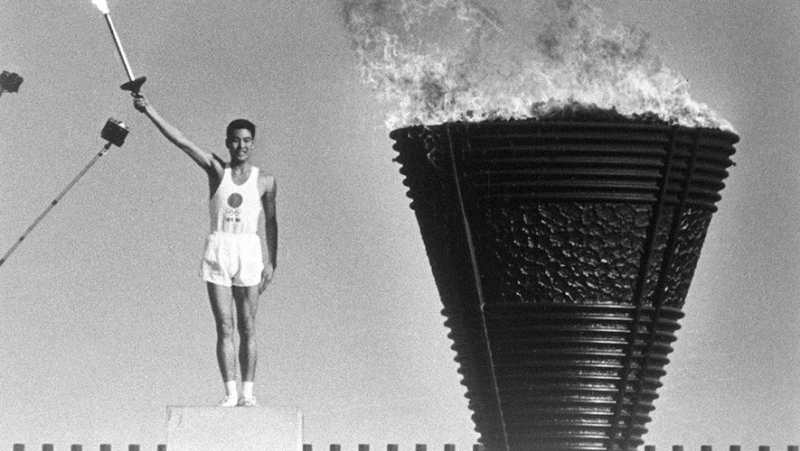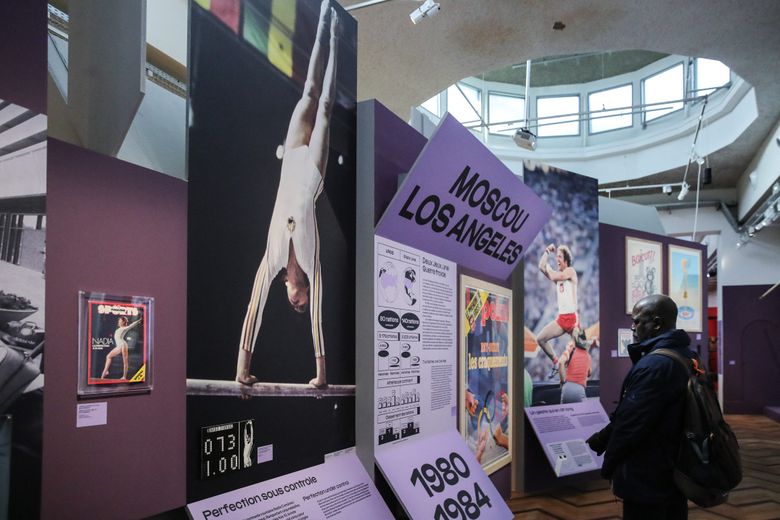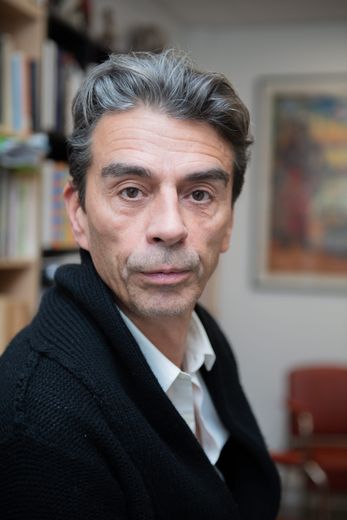Paris 2024 Olympic Games: “The Olympic Games tell our story, they have always been the sounding board of the world”

Tokyo 1964 : le Japon renaît de ses cendres à l’image du dernier porteur de la flamme, Yoshinori Sakai, né à Hiroshima le jour du bombardement. MAXPPP
Historian at the Center for International History and Political Studies of Globalization in Lausanne, Pascal Blanchard is also the curator of the exhibition ’Olympism, a history of the world" , in Paris. He explains why the history of the Games tells the story of changes in our society and globalization.
Through your book on 130 Olympic history, in connection with the exhibition at the Palais de la Porte Dorée, your concern was to show that the Games reflect our history ?
This is exactly our approach, which is based on the premise that the Olympic Games are one of the rare structures that have existed for 130 years. Even the UN is much younger. The Games reflected the changes in our World. The mechanism of tests every 4 years allows you to have a gap during which you look at the World. First there are the internal changes to the Games – place of women, place of minorities, participating countries – but also the sounding board of the world: cold war, rise of nationalism, transition to professionalism, globalization and media coverage. The day a TV camera landed in 1948 at the London Olympics, everything changed.
And minorities are regularly expressed…
From the time of the colonial empires, the games allowed them to have a platform. Mexico's gesture is striking. You have this chance to be watched by the world. Would they have raised their fists on the podium without the cameras?? The same for women's fight for parity which lasted 130 years. Suzanne Lenglen was a pioneer in speaking about her freedom, her lovers, her divorces. She was the first to say "I am a woman who earns my living". In the Porte Dorée exhibition, we tell this story through real characters, that’s what’s fabulous.
Porte Dorée exhibition: a fabulous gallery of portraits
The National Museum of the History of Immigration, at the Palais de la Porte Dorée, in Paris, is the scene of a fascinating exhibition ’ Olympism, a history of the world, on view until September 8 and which serves as support for the book published by Editions de La Martinière. Each Olympics is the subject of panels retracing the great sporting moments placed in their political and societal context.
Thus, through the evolution of the Games, the exhibition traces the construction of nation-states, the place of minorities, decolonization and the emergence of mass culture .
« We wanted to tell this story through portraits of real people like Suzanne Lenglen, who was the first female star of the 20th century, that's what's fabulous », sums up Pascal Blanchard, curator of the exhibition.

At the Palais de la Porte Dorée, an exhibition exploring each Olympiad. MAXPPP – TERESA SUAREZ
You also mention the gigantism of the Games. Where is the tipping point ?
As early as Montreal, in 1976, we felt this phenomenon of gigantism. But the real realization came at the 2004 Games in Athens. In a country already in economic crisis, 85% of installations have been left abandoned. This highlighted the aberration of ruining oneself for a competition without perpetuating its legacy. The ecological debate arrived at the same time. The Sochi winter games cost between 45 and 50 billion. When you fly over the area in a helicopter, you see the incredible devastation this has wreaked on nature.
We are now hesitant to apply for the Games?
Exactly. European countries that have held municipal referendums have all lost. If there had been one in Paris on the opportunity to organize the Games there, I am not sure that Ms. Hidalgo would have won. The 2032 Games were held in Brisbane without any competition and there are huge debates there about the relevance of having accepted them.
Paris declares that it is committed to a green approach. It seems tenable to you ?
London and Rio had made the same claims without following through with the process. France has no choice. This is now a fundamental implication of the IOC in the specifications. He knows he is being observed and criticized on this subject. We will take stock a posteriori, particularly regarding the cost for the Seine. Was it relevant to have spent 1.4 billion to try to clean it up? This is a real subject. The infrastructures are supposed to be completely reusable but here too we will have to take stock afterwards. I remind you that Qatar had committed to Fifa to have demountable stadiums installed in Africa. You can go to Qatar, the stadiums haven't moved…
These Games will take place in a troubled international and domestic context. It brings back memories ?
We think of both the Mexico Games and turbulent domestic politics – there was a huge student repression in Mexico City – and an international context reminiscent of the 1972 Games with the Middle East crisis. And then it reminds me of the ’56 Games, in Melbourne, when Russia invaded Hungary. We have all these memories accumulated in those of Paris. The opening photo of the games remains an image watched by the world. Which Prime Minister and which President of the National Assembly will be next to Emmanuel Macron? This is a question that concerns many external observers. There are always two or three images that deeply mark an Olympiad, this one can be one of them.
A hundred years ago, the Paris Games took place in an illusory peaceful context ?
Totally. Illusory because France banned Germany from participating in the Games. Only the winners were invited. Coubertin also wanted to show that France had been capable of recovering from the 14-18 war. And then these were undoubtedly the real first modern Games. Apart from the flame, all the codes were there. We had abandoned the construction of a large stadium because already at the time, the question of sustainability arose. In 1936 Hitler wanted, on the contrary, to show his power through the scale of his installations.
Book: 130 years of history of the Olympics
This is a truly titanic piece of work carried out by the historian Pascal Blanchard with around sixty specialists as part of the « History, sport and citizenship. » This magnificent work of 576 pages with an encyclopedic volume, echoes the exhibition of the same name at the Palais de la Porte Dorée.
It pays tribute to the athletes who made the history of the Games and offers an overview of each Olympiad to show how the changes in our society took shape through the Games.
Editions de La Martinière. 65 €.

Pascal Blanchard, historian and researcher at the Center for International History and Political Studies of Globalization, co-author and curator of the exhibition “Olympism, a History of the World.” MAXPPP – David ADEMAS/OUEST-FRANCE
Coubertin really thought, by creating the Olympic Games, to transpose national rivalries to the sporting field and avoid armed conflicts ?
Yes because he considered that the time of war had to find common ground where nations would compete otherwise. He wasn’t totally wrong. Sport has indeed become a field of rivalry between nations even if the Olympic truce is a pipe dream. Coubertin was not fundamentally wrong. Although this did not prevent much conflict in the 20th century, it brought about the idea that nations could play sports together, which was inconceivable in the 19th century compared to the rivalries that existed. .
These Games which aim to be apolitical are more so than ever…
There is no such thing as apolitical games. Behind the very organization of the Games, there are nations, therefore a ranking, a meaning, interests. Russia refused for 25 years to come to these bourgeois games and invented its Spartakiads. The boycotts of 1980 and 84 clearly showed that playing sport in a country is not neutral.
How to imagine the evolution of the Olympic Games?
Four elements mark us today. The time for fighting to organize the Games is over. You will have more and more strong regimes which will obtain them because public opinion will oppose them. Second change, this will induce eco-responsibility with a distribution across several countries. We are talking about an agreement between several African countries to organize the Games in 2036 or 2040. The media are also putting strong pressure so that the Games return to their original time frame over six months as in 1900. Because the media need to have more time for the Games. rsquo;elasticity and create events over time in relation to the price paid. You will have a moment around co sports, a moment around athletics, etc… You will also have a change in sports. And e-sport is going to be the big revolution in the Olympics in the next 20 years because we have to do things that appeal to young people. Finally, the IOC, which is constantly increasing its commitment to the Olympic Games. adapting for 130 years, will have to invent other methods of financing linked to new technologies, our cell phones, with increasingly demanding partners. Sponsors use the long term much more. Finally, the ultimate change, it will inevitably see the emergence within 20 years of events reserved for transgender athletes because it is another social change in progress.
I subscribe to read more




